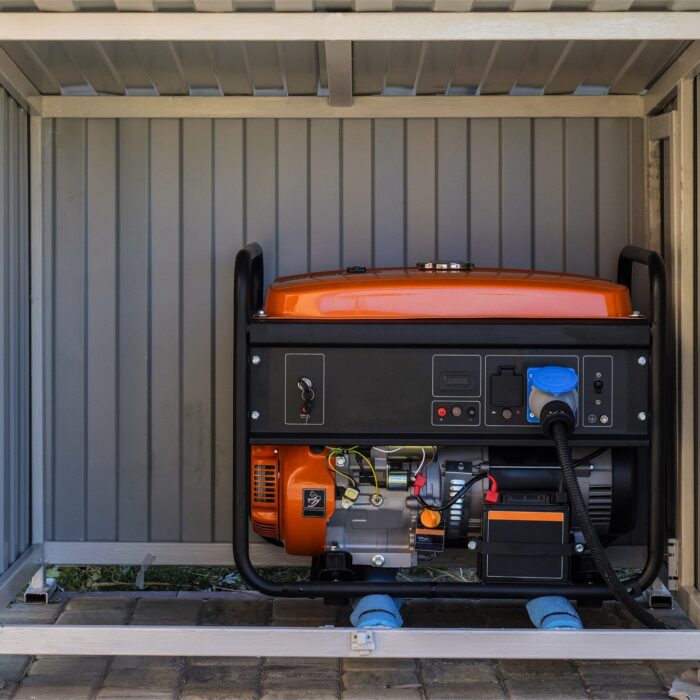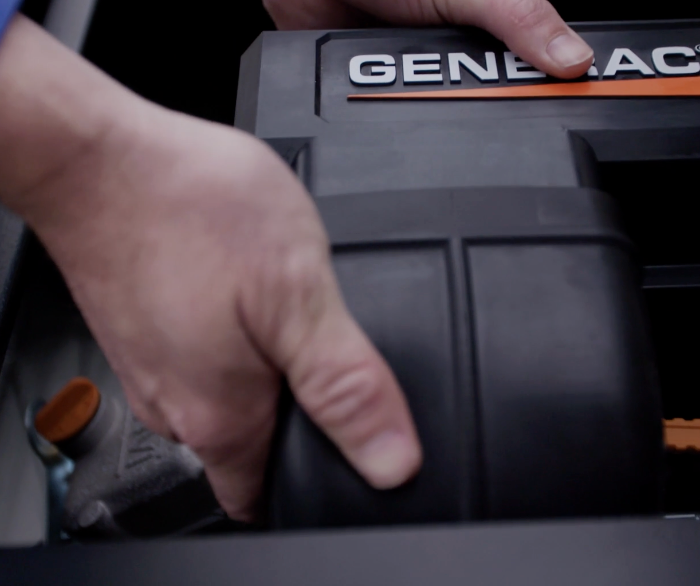Living through a power outage is more than just inconvenient – it can pose a serious safety risk when handled poorly. Power outages can disrupt communication systems and stop people from using medical devices. Food can spoil, water can become contaminated, and banks and delivery services may shut down.
A generator can help you get through these outages with minimal issues. But should you invest in an automatic standby generator or a portable generator? Read on to learn the pros and cons of each option.
Automatic Standby Generator vs Portable Generator Options
A generator is a piece of equipment that provides your home with electricity in an emergency. If there’s a power outage, it turns on and powers the electric outlets in your home. This lets you continue charging devices, running home appliances, using TVs, and powering HVAC units.
An automatic standby generator is a type of home generator that’s permanently installed outside of your home. When you have a power outage, it senses the issue immediately and automatically begins providing your home with a current. This means that you’ll only be left without power for a few seconds and will instantly have electricity again within moments.
A portable generator is another type of backup generator. Like standby generators, it converts fuel into electricity and uses it to power your home for the duration of most power outages. However, while a standby generator usually operates on natural gas or liquid propane, a portable option usually requires many gallons of gasoline to continuously convert energy into electricity.
Portable generators don’t automatically sense an outage and begin running. You must turn it on yourself when you notice that the power is out. If you don’t manually turn your generator on, your home appliances aren’t going to get the current they need to run.
Which Is More Expensive?
Many people believe that a portable generator is cheaper than a standby home generator. This makes sense when you consider the upfront installation costs. An automatic standby generator is expensive to professionally install.
However, “portable generators are inexpensive alternatives” is actually a myth. This is because they exclusively run on gasoline. A portable generator can use up to twenty gallons of gasoline every day to get you through a power outage.
If you drive a gas-powered car, you know that these costs add up fast. Gasoline prices are higher than ever before, at about $3.50 per gallon. Twenty gallons of gas is around $70, so a 2-day power outage will cost you $140.
Gasoline Costs in High-Risk Areas for Power Outages
While power outage frequency is increasing across all US states, some areas are at a higher risk than others. A 2023 study in the Nature Communications journal found that Louisiana, Arkansas, Alabama, and Northern Michigan are the most likely locations to experience blackouts.
Power outages are 52 times more likely in these areas, and there are many reasons for this. Southern areas (and Michigan) have heavier precipitation than most states. Hurricanes and high winds are also likely in these states.
The study found that 231,000 power outages lasted over an hour in these states between the start of 2018 and the end of 2020, with 17,484 lasting for longer than eight hours.
That means that those in these states will need to pay a lot of money for frequent power outages if they use portable generators. An automatic standby alternative would cost much less.
Other Power Outage Costs
There are also other costs to consider. Since portable generators don’t turn on automatically, your appliances will have no power until you manually switch on the generator. If you’re at work or running errands, you might not have any power for hours until you get home and realize there is no electricity.
The US government recommends you throw out all refrigerated food after just four hours without power. This will waste a lot of money, and you may be left without much to eat during longer outages if grocery stores and delivery services are closed.
It is easy to prevent this with a standby generator. Because they start running automatically, you’ll never need to worry about your food spoiling. Even if you’re out for several hours, your home will have power and your food will be fine.
Other Automatic Standby Generator Benefits
Many power outages result from natural disasters like tropical cyclones or massive windstorms, which shut down many lines of communication including the internet and sometimes traditional landline phones.
This is a big problem for those looking to make emergency calls or send online messages. Luckily, almost everyone has a cell phone to provide them with a method of communicating with loved ones and emergency services. But if you don’t have electricity for several hours, your phone will die and leave you without this option.
The reliable electricity that a standby generator provides means that you can charge your phone as frequently as you need. You can communicate with anyone you need to contact. You’ll also have access to all your favorite news apps to get updated information (and game apps for entertainment purposes).
Another critical reason that you may need constant power is to power medical devices. If anyone in your household relies on a ventricular assist device or oxygen tank, reliable electricity is literally a life-or-death matter.
A portable generator can easily run out of gasoline or break down mid-use. It’s not made for long-term outages and will work inefficiently after a few hours. This means that loved ones may not have the medical devices they need to survive. A standby generator can give you peace of mind.
Start the Process of Installing a Generator
Now that you know the benefits of an automatic standby generator over a portable generator, it’s time to begin powering your home. Generator Supercenter is committed to installing whole-house generators on private properties to provide you with reliable electricity.
Our certified electricians not only offer quality turnkey installation services, but also will provide you with long-term maintenance and servicing. Request a quote to learn more about residential generator installation and talk with us about your specific needs.





